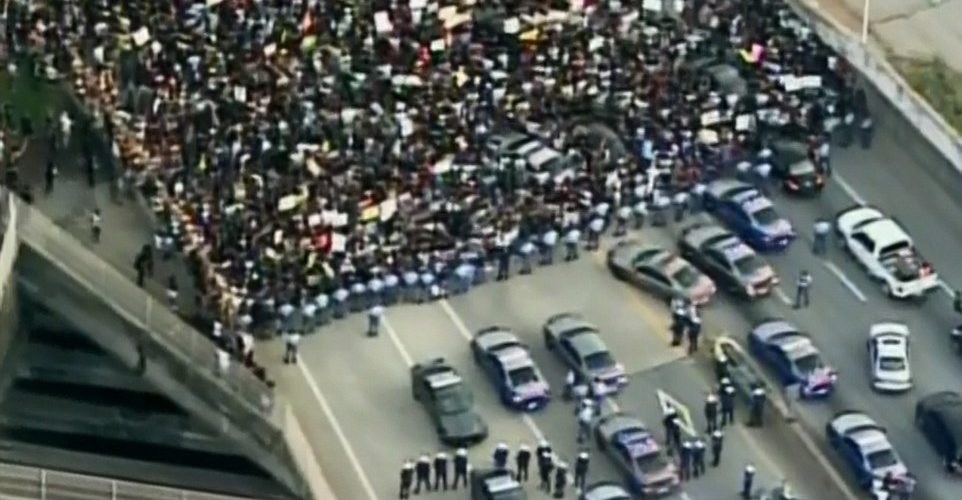(EDITOR’s NOTE: This post by Aaron Crumbey was written several years ago, in the wake of a string of brutal police encounters with African-Americans, setting off yet another crisis. What Aaron wrote then is still profound now.)
I’ve been thinking about writing this post for weeks. My hope is to stir up those who are leading the next generation. You need to know that you’re not just leading students. You’re leading change-agents of the future, and with that comes more responsibility than you may know.
We are living in times that are only getting crazier and crazier. What has been laying dormant has awakened— it’s ugly, and it’s changing our world as we know it. Systemic racism isn’t new. Disillusioned people thinking violence is the answer isn’t new either. I believe what is new is how prevalent these issues are today. And when everyone’s a reporter with a camera phone news travels faster than the speed of light. I wonder what we would see recorded if people had camera phones in the 1940’s and 1960’s. Whether it’s a school or church, it’s all been touched by hate and dysfunction. Just in the last few days, our world has gotten much worse:
- July 6 – Philando Castile was killed by a cop, who shot him multiple times while his girlfriend and daughter were in the car. This incident was broadcast live on Facebook immediately afterward.
- July 7 – Alton Sterling was killed after being pinned down by two police officers and shot multiple times. This incident was broadcast live on Facebook for the world to see.
- July 9 – Out of retaliation for the deaths of Philando, Alton, and others, five cops were killed and seven others were wounded in Dallas after a peace rally.
- July 17 – Three more police officers were killed out of retaliation for the two black men who were killed the prior week in police incidents.
- And the list goes on…
Now, I’m not here to argue over who was right or wrong, because at the end of the day these are all tragedies. The question I want you to wrestle with is: “What will be your response to your students?”
You see, it’s easier to do ministry as usual and not address what’s happening in the world. But when you ignore it, you’re keeping students comfortable. You are helping them compartmentalize life from their faith. But God intended for our faith and our life to intersect at every level. There is a faith component that needs to be shared and talked about in the midst of this. No progress is made by sheltering your students.
You can’t truly teach teenagers to love their neighbors when you’re not letting them see that their neighbor may be someone who looks different, acts differently, and believes differently than them. Or even that their neighbor could be someone who wished to do them harm.
You can’t truly teach students to see people the way that God sees them regardless of their actions until they know how truly evil people can be. God sees through the evil, and they must learn to do the same.
You can’t teach kids that all life is to be valued and not allow them to wrestle with the fact that they won’t want to value everyone’s life all the time. My point is they can’t become the Church that’s needed today by being sheltered or spoon-fed a safe faith that is built in “pleasantville.”
And if you think it’s not our place or they’re not interested, just check their social media. They are talking about it, and even if they aren’t talking about it they see it because it’s everywhere. And you would probably be shocked by the stance that some may take on some of the issues.
We gotta address it—if you don’t know where to start, start here:
1. Allow the pain of others to interrupt your plans – You are modeling for students the Christian response to the pain of our world. So postpone that series or game or song and acknowledge what’s going on.
2. Model empathy – Teach your students to not just sympathize with others, but empathize with them. They need to learn to walk with people.
3. Have conversations – “Those who forget the past are doomed to repeat it.” Now, you don’t have to live in the past, but you do have to remember the past in order to preserve the future. So talk and have real authentic conversations about what’s going on.
We have to ask ourselves how we are equipping the next generation to deal with the world they will inherit, because I believe this is just the beginning. They need to know more about God’s Word than they do about TikTok, and they will need to understand the power of prayer much more than they do the power of a perfect selfie. This is a moment in time where ministry as usual just won’t cut it. So in your next staff or volunteer meeting ask, “How are we going to deal with what’s going on in our world today in our youth group?”
God help us,
AC


Thank you for posting this blog. It really cuts to the heart of the matter. I’m going to share it at our leadership meeting tomorrow night.
Thank you… I think sometimes we can get caught up in doing ministry that we forget we are leading the future. How do we prepare them to live their faith out in a world that is crazy, if we shelter them from it? we can’t.